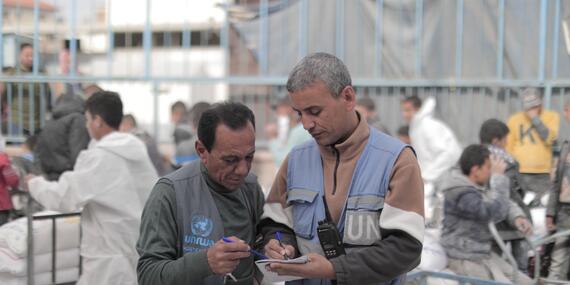Today's top news: Occupied Palestinian Territory, Ukraine, Haiti

Occupied Palestinian Territory
Strikes continue in Rafah, heightening concerns of an escalation in Gaza’s southernmost city, where hundreds of thousands of Palestinians have sought refuge. Those who are internally displaced have nowhere safe to go, as humanitarian conditions continue to deteriorate – with acute shortages of safe areas, shelters, clean water, food and medicine.
OCHA stresses, once again, that civilians must be protected and their essential needs met.
Heavy fighting also continues to be reported in Khan Younis, particularly near Nasser and Al Amal hospitals, jeopardizing the safety of medical staff, the wounded and the sick, as well as internally displaced people. There have been reports of fatalities and injuries in the courtyard of Nasser hospital as well as of damage.
Yesterday, volunteers were able to exit Nasser hospital and reroute sewage from a broken pipeline that was flooding the emergency room and threatening to shut it down. This was made possible after OCHA coordinated a local, three-hour pause, which was agreed by the Israeli military. A permanent fix of the pipeline is still pending.
At the same time, Al Amal Hospital continues to contend with acute shortages of fuel and medical supplies and currently has only one functional operating room.
Across Gaza, humanitarian operations, including needs assessments and deliveries, are heavily constrained, including due to denial of access and attacks hitting coordinated convoys or surrounding areas.
Humanitarian colleagues working on education have analyzed satellite images to assess damage to schools across Gaza. Their assessment found that 162 school buildings have been directly hit, representing nearly 30 per cent of the total 563 school buildings in Gaza. At least 26 of these buildings have been destroyed. Some 175,000 students and more than 6,500 teachers have had their schools directly hit in hostilities. At least 55 per cent of schools in Gaza will require either full reconstruction or major rehabilitation.
Since the escalation of hostilities, 11 humanitarian partners have reached more than 135,000 students and teachers with psychosocial support, emergency learning, and recreational supplies and activities in all areas to the south of Wadi Gaza. Temporary learning spaces are being established to allow for non-formal education activities with displaced children in shelters.
Ukraine
Attacks on energy facilities continued in Ukraine today.
In the Dnipro region, in the east of the country, after two days of strikes on energy facilities, local authorities reported another attack overnight on a thermal plant. This prompted the evacuation of a hospital and the closure of schools in the impacted areas, due to low temperatures.
Other damage to energy facilities was also reported in Donetsk, Chernihiv, Kharkiv, Kherson and Sumy regions.
On the frontline, our humanitarian partners continue to support communities whose access to critical services has been severely hampered by active hostilities. In the community of Siversk, in the Donetsk Region, aid organizations supported the installation of a filtering station for clean water. People in Siversk have been living for months without access to gas, water and electricity due to the destruction of the critical infrastructure.
In 2023, humanitarian organizations helped nearly 825,000 people access clean water in the frontline Donetsk Region.
Haiti
The Humanitarian Coordinator there, Ulrika Richardson, condemned the recent violence that has further escalated in the capital and across the country.
She said in a social media post yesterday that civilians – in particular, children – are bearing the brunt of recent violence.
Yesterday, according to humanitarian partners on the ground, a medical facility in Port-au-Prince was caught in heavy exchange of gunfire, prompting the facility to evacuate patients and staff.
Ms. Richardson emphasized that civilians and civilian infrastructures must be protected, and humanitarians must have safe and unrestricted access to people in need.
More than 313,000 people are displaced across the country. More than 1,000 schools in Haiti, including in Port-au-Prince and other urban areas, have also been temporarily closed since mid-January due to ongoing demonstrations.
Weeks of violence have also led to an increase in basic commodities, including food items, in some cases as much as by 25 per cent.
